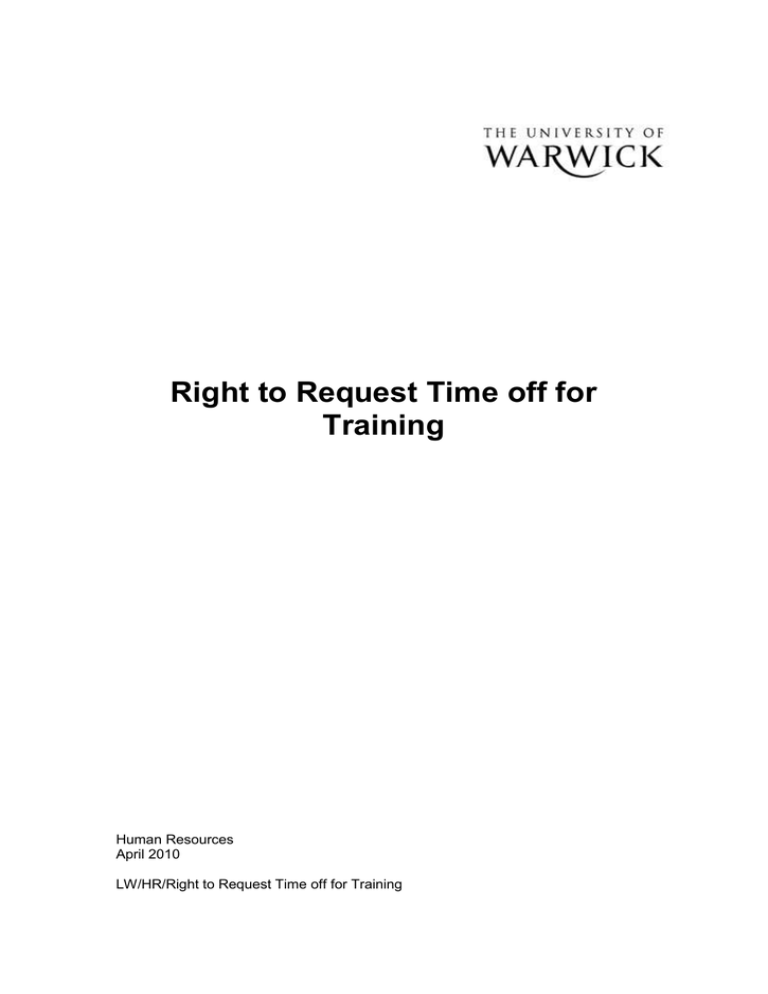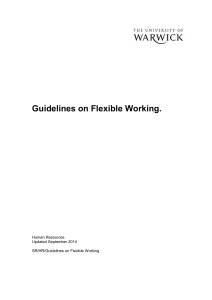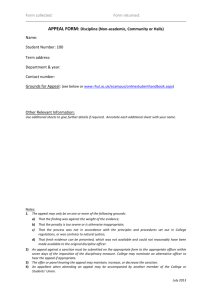Right to Request Time off for Training
advertisement

Right to Request Time off for Training Human Resources April 2010 LW/HR/Right to Request Time off for Training 1.0 INTRODUCTION 1.1 From 6 April 2010, under the Employment Rights Act 1996 (ss 63D-63K), employees will be able to formally request time away from their core duties to undertake training which will help them develop specific skills relevant to their job. 1.2 The University recognises the benefits of being able to support staff training and development, recognising that affording employees the opportunity to undertake study or training will benefit both the employee and the University. These Guidelines provide details of the eligibility and process relating to requests for time off for training. 2.0 ELIGIBILITY 2.1 To be eligible to make a request an individual must: be an employee of the University have worked for the University continuously for 26 weeks at the date the application is made have not made another application under the right during the last 12 months 2.2 Employees can make requests to undertake any training which they believe will improve their effectiveness in their role and the performance of the University. The training can include accredited programmes - leading to the award of a recognised qualification - or shorter unaccredited training to help them develop specific skills relevant to their job. 2.3 Employees should note that the legislation specifically relates to the right to request time off for training and there is no obligation on the University to either pay for the time off or to pay for the training where it agrees to requests. Any requests for funding for training should be discussed with either the department or the Learning and Development Centre. 3.0 APPLICATION PROCESS 3.1 Employees who meet the above eligibility criteria and wish to make a request should do so in writing to their Head of Department (or nominated representative) stipulating the following information: that it is an application to make a statutory request in relation to study or training; the date of the application; whether or not a previous application has been made in relation to study or training, and if so when and how the last application was submitted; the subject matter of the proposed study or training; where and when the proposed study or training would take place; who (if anyone) would provide or supervise the study or training; what qualification (if any) the study or training would lead to; and how the employee thinks the proposed study or training would improve his/ her effectiveness and the performance of the University. 3.2 Where a valid request has been submitted, the Head of Department (or nominated representative) should arrange a meeting with the employee to discuss the request as soon as practicable. The meeting will normally take place no later than 28 days after the date on which the request was submitted. The purpose of the meeting will be to discuss the request; its appropriateness to the employee’s job and the needs of the University and any possible alternative arrangements that might meet the employee’s training needs. 3.3 In considering requests departments should consider the relevance of the training, what contribution the employee would be able to make to their department/role as a result of the training, the time required to complete the training and any funding considerations. 3.4 Employees will have the right to be accompanied at this meeting by a work colleague or Trade Union Representative. 3.5 Within 14 days of the date of the meeting the Head of Department (or nominated representative) must write to the employee either: (a) (b) (c) accepting the request and establishing a start date confirming any compromise agreed in the meeting rejecting the application 4.0 NOTIFICATION OF ACCEPTANCE OF A REQUEST 4.1 The Head of Department (or nominated representative) must confirm the details of the agreement in writing, including the following: the subject of the study or training where and when you expect that it will take place, and over what period who will provide or supervise the training what qualification (if any) the training will lead to how the training time will be taken - eg whether it will be paid, unpaid, or whether the employee will work flexibly whilst undertaking the training how the costs of the training will be met 4.2 If the approval requires a change in working hours or any other contractual changes a Request to Amend an appointment form should be completed in the usual manner. 4.3 The University is not legally obliged to pay an employee for any time off granted for study or training under the right to make a request in relation to study or training. Therefore, any time off for training agreed will normally be unpaid or an agreement made for the time to be made up at an alternative time. If the leave is unpaid the department should ensure that the Payroll department are notified in order to make the necessary adjustments to salary. 5.0 NOTIFICATION OF REJECTION OF A REQUEST 5.1 If the request is rejected the University must inform the employee in writing of (a) the basic grounds for refusing the application (b) (c) 5.2 a sufficient explanation as to why the business grounds for refusal apply in this circumstance (see below) the right of appeal If the employees application or appeal are rejected, the University must provide a sufficient explanation as to why. The business grounds as set out in the legislation are as follows: the proposed study or training would not improve the employee's effectiveness in your business the proposed study or training would not improve the performance of your business the burden of additional costs agreeing to the request would have a detrimental effect on your ability to meet customer demand you would be unable to reorganise work among existing staff you would be unable to recruit additional staff agreeing to the request would have a detrimental impact on quality agreeing to the request would have a detrimental impact on performance there would be an insufficiency of work during the periods the employee proposes to work there are planned structural changes during the proposed study or training period 6.0 RIGHT OF APPEAL 6.1 If an employee’s request in relation to study or training is refused, the employee will have the right to appeal against this decision to a more senior manager who was not involved in the original decision. The person to whom appeals should be addressed will ordinarily be included in the notification letter. Any appeal should be submitted within 14 days of the decision to refuse the request. The appeal notice must be in writing and must include the grounds on which the employee wishes to base the appeal. 7.0 ADVICE 7.1 Advice may be sought from the link HR Adviser on any aspect of this procedure. In addition to the options outlined above the University also has guidelines on flexible working, career breaks or buying additional annual leave which may also be relevant. 8.0 EQUALITY IMPACT ASSESSMENT 8.1 The University of Warwick recognises its responsibility to ensure that no-one is discriminated against or disadvantaged, through membership of any particular group, or on the grounds of age, disability, gender, race, religion, or sexual orientation. For additional information please refer to the University’s Equality and Diversity website (http://go.warwick.ac.uk/ equalops/).




